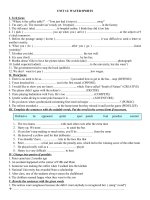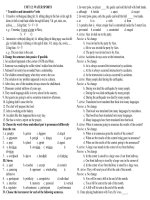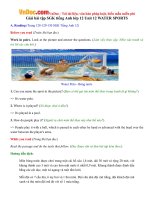- Trang chủ >>
- Đề thi >>
- Đề thi lớp 11
BTAV 12 UNIT 12 WATER SPORTS test keys
Bạn đang xem bản rút gọn của tài liệu. Xem và tải ngay bản đầy đủ của tài liệu tại đây (441.84 KB, 9 trang )
UNIT 12 ~ WATER SPORTS
1. Multiple Choice.
1. We were..........a penalty after a late tackle.
A. rewarded
B. got
C. awarded
D. reserved
2. He looked terrible this morning. I think he's..........the penalty for all those late nights.
A. doing
B. making
C. getting
D. paying
3. The new students were just left to..........or swim.
A. sink
B. dive
C. surf
D. float
4. There was a record..........of candidates for the post.
A. amount
B. deal
C. figure
D. number
5. No..........booking is necessary on most departures.
A. early
B. first
C. previous
D. advance
6. Being a combat sport, karate..........with it the risk of injury.
A. bears
B. carries
C. keeps
D. All are correct
7. This was outside the..........of his experience.
, A. level
B. rate
C. range
D. extension
8. Each correct answer will..........two points.
A. score
B. be scored
C. shoot
D. be shot
9. All students have to..........the rules.
A. follow
B. obey
C. observe
D. All are correct
10. Loose clothing gives you greater freedom of...........
A. act
B. action
C. movement
D. move
11. The referee..........a penalty kick.
A. gave
B. awarded
C. set
D. A and B
12. He suddenly..........a sprint.
A. commenced
B. started
C. broke into
D. B and C
13. He's just trying to..........his own career.
A. advance
B. improve
C. promote
D. A and B
14. "The longest fish in the contest was eighteen inches long." ~ "It........by Peter."
A. was catching
B. caught
C. was caught
D. catch
15. "I heard you decided to take up tennis." "Yes, I have.......every day."
A. been played
B. been playing
C. playing
D. play
16. "Are we about to have dinner?" ~ "Yes, it.........in the dining room."
A. is serving
B. serves
C. is being served
D. served
17. "Why is Tony in prison?" ~ "He.........of robbery."
A. has been convicted B. has been convicting C. has convicted
D. convicted
18. "Where are Jack and Joseph?" ~ "They........the boxes you asked for into the house."
A. have been bringing B. bringing
C. have been brought D. to bring
19. "Where's the old chicken coop?" "It............by a windstorm last year.'
A. destroy
B. is destroyed
C. was destroyed
D. destroyed
20. "We're still looking for Tom." ~ "Hasn't he.............yet??'
A. been found
B. to find
C. found
D. being found
21. "Whatever happened to that fortune-teller?" "I don't know. She around here in a long time."
A. hasn't seen
B. didn't see
C. hasn't been seeing D. hasn't been seen
22. "Diana is a wonderfurballet dancer." ~ "She.........since she was four."
A. has been dancing B. has been danced C. is dancing
D. was danced
23. "What a beautiful dress you're wearing!" "Thank you. It......especially for me by a French tailor."
A. is made
B. has made
C. made
D. was made
24. About 15,000 years ago, northern Wisconsin......under ice a mile deep.
A. buried
B. was burying
C. was buried
D. had buried
25. Edward was new on the job, but he quickly fit himself into the ........
routine of the office.
A. established
B. establishing
C. establishes
D. establish
26. The Mayan Indians..........an accurate and sophisticated calendar more than seven centuries ago.
A. were developed B. developed
C. are developed
D. have been developed
27. George is...........Lisa.
A. marry with
B. marry to
C. married with
D. married to
28. The rescuers..........for their bravery and fortitude in locating the lost
mountain climbers.
A. were praised
B. praised
C. were praising
D. praising
29. When I woke up and looked outside, the landscape had changed. The ground had been lightly........with a
dusting of snow during the night.
A. covering
B. cover
C. covers
D. covered
30. We can't even walk in the storm. Let's wait in the hallway where we'll be.........the strong winds until things
quiet down.
A. protected from
B. protected by
C. protecting from
D. protecting by
KEY
II. Find a suitable word for the sentences below. One example has been done for you.
0. A. In the distance, the sky was beginning to brighten .
B. I brighten up at their words of encouragement.
C. A personal letter will usually brighten up a person's day.
1. A. The centre is well equipped for.........and mountaineering.
B. The centre offers activities like.........and sailing and such.
C. .........is the sport of travelling in or racing a canoe.
2. A. It took her a mere 20 minutes to dispose of her..........
B. The fascination of the game lies in trying to guess what your........is thinking.
C. He knocked his..........down three times in the first pound.
3. A. The home team claimed a.......but the referee told them to play on.
B. In those days murder was always punished with the death.........
C. He walked up to the.......spot and struck the ball firmly into the back of the net.
4. A. Ducks were........around on the river.
B. We went.........then lay in the sun to dry off.
C. The United States won most of the track and field events.
Similarly, in......., the top three places went to Americans.
5. A. The winning........was scored by Hill.
B. He headed the ball into an open.........
C. Our ultimate.........must be the preservation of the environment.
6. A. You will be.........for poor spelling.
B. He was.........for time-wasting.
C. Foul play will be severely.........
7. A. She didn't........in the discussion.
B. We encourage students to.........fully in the running of the college.
C How many athletes..........in the race?
8. A. The team suffered a major setback when their best.........was injured.
B. The crowd booed and whistled when the.........came onto the field.
C. The Dutch..........will make his first appearance for Liverpool this Saturday.
9. A. She holds the world.........for the 100 metres.
B. He had broken the world 100 metres..........
C. I got to work in..........time.
10. A. The troops were finally given the order to
B. This research has done much to..........our understanding of language learning.
C. Press fast forward to.........the tape.
11. A. This new order will mean working..........
B. The union plans to raise the issue of........
C. They pay $150 a day plus..........
12. A. Which has.............., the leopard or the tiger?
B. The baby's whole body was covered in small red.......
C. His jacket was covered with..............of mud.
KEY
III. Fill in each gap with a word from the list belowo.
tie - sprinted - scuba-diving - windsurfing - referee - tank
individuals - foul - range - penalty - paddled - players
1. We........the canoe along the coast.
2. It was a clear.........by David on the goalkeeper.
3. The company offers.........as an add-on to the basic holiday price.
4. She jumped out of the car and.........for the front door.
5. The match ended in a.........
6. For the more energetic , we offer.........and diving.
7. He was sent off for arguing with the...........
8. The best ambassadors for the sport are the........
9. There is a full...........of activities for children.
10. Currently, ticket holders pay a..........equal to 25% of the ticket price when they change their flight plans.
11. It's a global problem - what can..........do about it?
12. The car blew up when flames reached its fuel..........
KEY
IV. Supply the correct form of the word in bold.
1. You have to be highly.............. to do well in sport these days.
(compete)
2. The manager spoke to them all...............
(individual)
3. A back injury prevented active..............in any sports for a while.
(participate)
4. There has been a lot of advance................for her new film.
(public)
5. An..............seat is a seat which can throw out the person flying an aircraft if they suddenly have to leave it
because they are in danger.
(eject)
6. She seems to regard any advice or help from me as.........
(interfere)
7. The information in that article is...........inaccurate.
(history)
8. They worked in..............to develop the software.
(collaborate)
9. They praised her for her...............
(honest)
10. If he isn't Spanish, what..............is he?
(nation)
KEY
V. Fill in each gap with a suitable preposition.
1. Police ejected a number of violent protesters..........the hall.
2. The penalty...........travelling without a ticket is £200.
3. Who is..........goal for Arsenal?
4. We are.........competition........four other companies for the contract.
5. He pulled as hard as he could...........the oars.
6. He rowed us............to the other side of the lake.
7. The report criticizes the government's record...........housing.
8. The water came..........our knees.
9. Each class is 45 minutes...........length.
10. There will be an increase..........the range of 0 to 3 per cent.
KEY
VI. Fill in each gap with only one suitable word.
1. Beckham was sent off for a..............in the second half.
2. Contractors who fall behind schedule incur heavy financial..........
3. He was...........the speed limit.
4. Manchester United cut through the defence to............the winning goal.
5. People who............such crimes aren't normal.
6. These paints can be used...........or in combination.
7. The...........is contracted to play until August.
8. The...........has leaked a small amount of water.
9. She never allows her personal feelings to........with her work.
10. The..............was well beyond the reach of the goalkeeper.
KEY
VII. Find the verb in each of the following sentences and write Vt if it is transitive and Vi if it is intransitive.
1. Did the news surprise you?
2. The sun wasn't shining.
3. Ann interrupted my story.
4. Do ghosts exist?
5. Will John come tomorrow?
6. Mr. Lee died last year.
7. Did Bob throw the ball?
8. Sue laughed loudly.
9. An old man told the story.
10. It hasn't rained lately.
KEY
VIII. Change the following active sentences to passive if possible. Some of the verbs are intransitive and
cannot be changed. Keep the same tense.
Example:
- A strange thing happened yesterday.
No change.
- Jackie scored the winning goal.
The winning goal was scored by Jackie.
1. My cat died.
2. I agree with Dr. Smith's theory.
3. Dr. Smith developed that theory.
4. Timmy dropped the cup.
5. The cup fell to the floor.
6. The assistant manager interviewed me.
7. It rained hard yesterday.
8. A hurricane destroyed the small fishing village.
9. Dinosaurs existed millions of years ago. 10. A large vase stands in the corner of our front hallway.
KEY
IX. Change the following active sentences to passive if possible. Some of the verbs are intransitive and
cannot be changed. Keep the same tense. Include the ‘by phrase’ only if necessary.
1. The children seemed happy when they went to the zoo.
2. After class, one of the students always erases the blackboard.
3. The solution to my problem appeared to me in a dream.
4. People grow corn in Iowa.
5. Peter came here two months ago.
6. Someone made this antique table in 1734.
7. An accident happened at the corner of Fifth and Main Avenue.
8. Someone stole my purse.
9. Someone was making coffee when I walked into the kitchen.
10. Translators have translated that book into many languages.
11. Jim's daughter drew that picture. My son drew this one.
12. The judges will judge the applicants on the basis of their originality.
13. My sister's plane will arrive at 10.35.
14. Is Professor Rivers teaching that course this semester?
15. When did someone invent the radio?
16. The mail carrier had already delivered the mail by the time I left for school this morning.
17. When is someone going to announce the results of the contests?
18. After the concert was over, hundreds of fans surrounded the rock music star outside the theater.
19. Ever since I arrived here, I have been living in the dormitory because someone told me that it was cheaper to
live there than in an apartment.
20. They are going to build a new hospital next year.
KEY
X. Choose the item among A, B, C or D that best answers the question about the passage:
Synchronized swimming is a water sport in which contestants perform choreographed maneuvers set to music.
Synchronized swimming requires agility, grace, timing, musical interpretation, and overall body strength.
Three competitive synchronized swimming events are recognized internationally: solo, duet, and team
(consisting of eight swimmers), although all three events are not always held at each competition. In each event,
synchronized swimmers compete in three categories: figures, technical routine, and free routine. All three
categories are also not always held at each competition.
In the figures competition, swimmers perform 4 of a possible 20 figures, or combinations of movements. A panel
of judges awards points from 0 to 10 based on the accuracy of the performance and the timing, height, stability, and
control of the figures. In the technical routine, the swimmers must perform a set list of elements, or combinations
of figures and swimming Strokes, in a prescribed order. In the free routine, swimmers can create their own
choreography of figures and strokes. In the technical and free routines, which can last from two to five minutes
each, depending on whether they are in solo, duet, or team competition, a panel of judges awards points from 0 to
10 in the categories of technical-merit and artistic impression. Technical merit encompasses the execution,
synchronization, and difficulty of the elements. Artistic impression includes the choreography, musical
interpretation, and manner of presentation of the performance. Routines are enhanced by swimmers' use of original
and expressive movements, patterns, and rhythms. The scores for the figures and the routines are weighted
according to a formula and combined for each competitor to determine the winner.
1. What are the synchronized swimming events recognized internationally?
A. Figures, technical routine, and free routine.
B. Solo, duet, and team.
C. A set list of elements.
D. All are correct.
2. What categories do synchronized swimmers compete in each event?
A. Grace, timing, musical interpretation.
B. Choreography of figures and strokes.
C. Figures, technical routine, and free routine.
D. Movements, patterns, and rhythms.
3. How do judges award points to the performance in the figures competition?
A. Based on height, stability.
B. Based on the accuracy of the performance and the timing.
C. Based on control of the figures.
D. All are correct.
4. How long do the technical and free routines last?
A. They last two minutes each.
B. They last five minutes each.
C. They last four minutes.
D. It depends on whether they are in solo, duet, or team competition.
5. What does the manner of presentation of the performance belong to?
A. The accuracy of the performance.
B. Technical merit.
C. Choreography of figures and strokes.
D. Artistic impression.
KEY
XI. Choose the item among A, B, C or D that best answers the question about the passage:
Water polo originated in England during the 1870s and soon became popular in the United States. It was first
played in the Olympic Games as a men's exhibition sport in 1900. In 1904 it became a men's medal sport, but only
the United States fielded a team. In 1908 it was contested internationally at the Olympics. Over the succeeding
decades water polo became especially popular in Europe.
From approximately 1920 to 1946 the United States departed from the international rules for water polo by
adopting for play a loosely inflated ball that could be gripped in one hand and carried toward the goal. Opposing
players usually attempted to seize the ballcarriers, wrestle them under water, and render them helpless from loss of
breath. This rough style of play virtually disappeared by 1946. Since that time traditional water polo has grown
rapidly in North America, especially as a college sport. It is particularly popular in southern California and other
parts of the West.
Women have played water polo since the game's early days, but participation was not widespread until the 1960s.
In 1961 United States Water Polo established a national club championship for women. It has hosted one fbr men
since 1890. Women's water polo became an Olympic medal sport at the 2000 Games in Sydney, Australia.
1. Where did water originate?
A. In Europe.
B. In England.
C. In the United states.
D. In North America.
2. When did water polo become a men's medal sport in the Olympic Games?
A. In 1875.
B. In 1900.
C. In 1904.
D. In 1908.
3. When did the players the United States follow the same rules as in Europe?
A. In 1920.
B. In 1945.
C. In 1946.
D. In 1960.
4. In what parts of the United States does water polo is very popular at colleges?
A. In the East.
B. In the South.
C. In the West.
D. In the Midwest.
5. When did water polo become a women's medal sport in the Olympic Games?
A. In 1900.
B. In 1960
C. In 1980.
D. In 2000.
KEY
XII. Read the following passage and then choose the best answer.
The excitement of snorkeling in a clear sea is hard to explain to someone who hasn't done it. If you expect to
have the opportunity of trying it when on holiday, it is well worth bringing a snorkel if you can get hold of one.
Experts now recommend a separate breathing tube.
Many swimmers take a deep breath before diving with a snorkel. This is a mistake, because it makes the body so
light that you dive with difficulty. It is best to take a couple of deep breaths and then a normal relaxed breath in
order to breathe in enough for the dive. Don't take repeated deep breaths before diving because this can lead to a
shortage of oxygen, which causes unconsciousness with warning.
The backs of many snorkellers get badly burnt, for the snorkellers are so involved in the world below they forget
about the dangers of sunburn. The sea does not protect your back from the rays of the sun, and it is best to wear a
T-shirt. Snorkellers should also consider wearing shoes (or slippers), which may protect their feet from cuts from
sharp rocks which can easily become infected.
1. What does the writer find difficult about snorkelling?
A. Doing it in tropical seas.
B. Explaining the technique to a beginner.
C. Doing it for the first time.
D. Describing how exciting it can be.
2. Why is taking a deep breath before diving a mistake?
A. You will not be able to dive deeply enough.
B. You will not be able to float properly.
C. You will use up too much oxygen.
D. You will lose consciousness.
3. The general impression of snorkelling the writer gives is that........
A. it is extremely dangerous.
B. most swimmers can learn to do it.
C. you have to buy special clothes in order to do it. D. many people who do it suffer from oxygen shortage. KEY
XIII. Choose the correct sentence among A, B, C or D which has the same meaning as the given one.
1. Your refusal to attend the party made everyone sad.
A. Everyone felt sad attending the party.
B. Everyone felt sad when you refused to attend the party.
C. Your attendance at the party made everyone feel sad.
D. You made everyone sad about your refusal to throw the party.
2. Mr. Smith is now the fifth wealthiest man in this city.
A. Mr. Smith is wealthier than five people in this city.
B. No one in this city has more wealth than Mr. Smith.
C. Mr. Smith is the wealthiest one in this city.
D. Only four people in this city are wealthier than Mr. Smith.
3. California attracted people from many countries when gold was discovered in 1848.
A. Discovered in 1848, gold was attractive to people in California.
B. Discovered in California in 1848, gold attracted people from many countries there.
C. Gold in California was discovered in 1848 after many people came here.
D. When people are attracted to California, they discovered gold in 1848.
4. Were it not for the money, this job wouldn't be worthwhile.
A. The only thing that makes this job worthwhile is the money.
B. This job is rewarding at all.
C. This job offers a poor salary.
D. Although the salary is poor, the job is worthwhile.
5. As soon as he arrived at the airport, he called home.
A. Calling home, he said that he had arrived at the airport.
B. No sooner had he arrived at the airport than he called home.
C. He arrived at the airport sooner than he had expected.
D. He arrived at the airport and called me to take him home.
6. I like Robinson Crusoe. He is the main character in a book by Daniel Defoe.
A. I like Robinson Crusoe because he is the main character in a book by Daniel Defoe.
B. I like Robinson Crusoe, who is the main character in a book by Daniel Defoe.
C. I like Robinson Crusoe and who is the main character in a book by Daniel Defoe.
D. I like Robinson Crusoe, who are the main character in a book by Daniel Defoe.
7. There was a hurricane in August 1992 over West Africa. This hurricane was named Andrew.
A. There was a hurricane who was named Andrew in August 1992 over West Africa.
B. There was a hurricane what was named Andrew in August 1992 over West Africa.
C. There was a hurricane which was named Andrew in August 1992 over West Africa.
D. There was a hurricane whom was named Andrew in August 1992 over West Africa.
8. There are a lot of people. The people like to do things together.
A. There are a lot of people whom like to do things together.
B. There are a lot of people who like to do things together.
C. There are a lot of people who like do things together.
D. There are a lot of people like to do things together.
9. Sue lives in a house. The house is opposite my house.
A. Sue lives in a house where is opposite my house.
B. Sue lives in a house which is opposite my house.
C. Sue lives in a house who is opposite my house.
D. Sue lives in a house and which is opposite my house.
10. The plants may develop differently. The plants grow on that island.
A. The plants which grows on that island may develop differently.
B. The plants which grow on that island may develop differently.
C. The plants grow on that island may develop differently.
D. The plants which grow that island may develop differently.
KEY
XIV. Finish each of the following sentences in such a way that it means exactly the same as the sentence
printed before it.
1. Keeping calm is the secret of passing your driving test.
As long as..................................................................
2. If you missed the programme you can't really judge.
Unless you.................................................................
3. Although he was not guilty, they executed him.
In spite of...................................................................
4. While I strongly disapprove of your behaviour, I will help you this time.
Despite my...................................................................
5. Is it essential to meet your aunt at the station?
Does you aunt...........................................................?
6. It won't make any difference if it rains because we'll still go.
We'll still go.................................................................
7. Don't you wish you could get out more in the evening?
Don't you get fed.........................................................?
8. It's nobody's fault that the meeting was cancelled.
Nobody..........................................................................
9. I write to him almost every day.
Hardly............................................................................
10. Mary told the police about the burglary.
Mary reported...............................................................
XV. Write complete sentences, using the words or phrases given.
1. Wakeboarding/boardsport.
2. It/ create/ from/ combination/ water skiing/ snow boarding/ surfing techniques.
3. Before/it/call/wakeboarding/it/call/skurfmg.
4. As in water skiing/ rider/ tow/ behind a boat.
5. Beginners/ start/ slower speeds/ as 18mph/ shorter ropes.
6. More experienced wakeboarders/ use faster speeds/ as 25mph/ but use longer ropes/ up/ 85 ft long.
7. Instead/ using skis/ rider/ ride a single board/ known/ a snowboard or skateboard.
8. Water skiing/ sport and recreational activity/ and/ popular/ many countries around the world
9. Rivers, lakes, and sheltered bays/ all popular/ water skiing.
10. Standard water skis/ originally made of wood/ but now/ usually constructed out of fibreglass-based composites.
KEY
The End
Notes.
Mayan Indians = The Maya people (sometimes Mayans) are a group of Indigenous peoples of Mesoamerica. They inhabit southern
Mexico, Guatemala, Belize, El Salvador and Honduras. The overarching term "Maya" is a collective designation to include the peoples of
the region that share some degree of cultural and linguistic heritage; however, the term embraces many distinct populations, societies, and
ethnic groups that each have their own particular traditions, cultures, and historical identity.
Mayan Indians
Snorkellers
Daniel Defoe
Robinson Crusoe
Robinson Crusoe is a novel by Daniel Defoe, first published on 25 April 1719. The first
edition credited the work's protagonist Robinson Crusoe as its author, leading many
readers to believe he was a real person and the book a travelogue of true incidents.
ANSWER KEY 12
I. Multiple Choice
1. C 2. D 3. A 4, D 5. D 6. B 7. C 8. A 9. D 10. C
11.D 12 .D 13. D 14. C 15. B 16. C 17 .C 18.A 19. C 20. A
21 D 22 .A 23. D 24. C 25. A 16. B 27 .D 28. A 29. D 30. A
II. Find a word
1. canoeing 2. opponent 3. penalty 4. swimming 5. goal 6. penalized
7. participate 8. player 9. record 10.advance 11. overtime 12. spots
III. Gap-fill
1. paddled 2. foul 3. scuba-diving 4. sprinted 5. tie 6. windsurfing 7. referee
8. players 9. range 10. penalty 11. individuals 12. tank
IV. Word formation
1. competitive 2. individually 3. participation 4. publicity 5. ejection 6. interference
7. historically 8. collaboration 9. honesty 10. nationality
BACK
V. Prepositions
1. from 2. for 3. in 4. in-with 5. on 6. over 7. on 8. above 9. in 10. in
VI. Gap-filling
1. foul 2. penalties 3. breaking 4. score 5. commit 6. individually 7. player 8. tank 9. interfere 10. shot
VII. Transitive or intransitive verbs.
1. Vt 2. Vi 3. Vt 4. Vi 5. Vi 6. Vi 7. Vt 8. Vi 9. Vt 10. Vi
VIII. Passive or not.
BACK
1. No change.
2. No change.
3. That theory was developed by Dr. Smith.
4. The cup was dropped by Timmy.
5. No change.
6. I was interviewed by the assistant manager.
7. No change.
8. The small fishing village was destroyed by a hurricane.
9. No change.
10. No change.
IX. Passive voice.
BACK
1. No change.
2. After class, the blackboard is always erased by one of the students.
3. No change.
4. Corn is grown in Iowa.
5. No change.
6. This antique table was made in 1734.
7. No change.
8. My purse was stolen.
9. Coffee was being made when I walked into the kitchen.
10. That book has been translated into many languages by translators.
11. That picture was drawn by Jim's daughter. This one was drawn by my son.
12. The applicants will be judged on the basis of their originality by the judges.
13. No change.
14. Is that course being taught by Professor Rivers this semester?
15. When was the radio invented?
16. The mail had already been delivered by.the mail carrier by the time I left for school this morning.
17. When is the results of the contests going to be announced?
18. After the concert was over, the rock music star was surrounded by hundreds of fans outside the theater.
19. Ever since 1 arrived here, I have been living in the dormitory because I was told that it was cheaper to live there
than in an apartment.
20. A new hospital is going to be built next year.
X. Reading - multiple choice.
1. B 2. C 3. D 4. D 5. D
XL Reading - multiple choice.
1. B 2. C 3. C 4. C 5. D
XII. Reading.
1. D 2. A 3. B
BACK
XIII. Transformation.
1. B 2. D 3. B 4. A 5. B 6. B 7. C 8. B 9. B 10. B
XIV. Sentence Transformation.
1. As long as you (can) keep calm, you'll pass your driving test.
2. Unless you watched the programme, you can't really judge.
3. In spHe of not being guilty/being innocent, he was executed.
4. Despite my strong disapproval of your behaviour, I will help you this time.
5. Does your aunt need meeting at the station?
6. We'll still go whether it rains or not.
7. Don't you get fed up with staying at home in the evening?
8. Nobody is responsible for the cancellation of the meeting.
9. Hardly did a day pass without my writing to him.
10. Mary reported the burglary to the police.
BACK
XV. Sentence building.
1. Wakeboarding is a boardsport.
2. It was created from a combination of water skiing, snow boarding and surfing techniques.
3. Before it was called wakeboarding it was called skurfing.
4. As in water skiing, the rider is towed behind a boat.
5. Beginners start at slower speeds such as 18mph with shorter ropes.
6. More experienced wakeboarders use faster speeds such as 25 mph, but use longer ropes up to 85 ft long.
7. Instead of using skis, the rider rides a single board, known as a snowboard or skateboard.
8. Water skiing is a sport and recreational activity and is popular in many countries around the world
9. Rivers, lakes, and sheltered bays are all popular for water skiing.
10. Standard water skis were originally made of wood but now are usually constructed out of fibreglass-based
composites.
To Top









